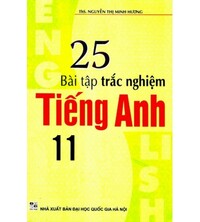Grammar - Unit 1. A long and healthy life - SBT Tiếng Anh 11 Global Success
1. Choose the best answers to complete the sentences. 2. Complete the sentences using the correct forms of the verbs in brackets. 3. There is a mistake in each item (1-8) below. Find the mistake and correct it.
Bài 1
1. Choose the best answers to complete the sentences.
(Chọn câu trả lời đúng nhất để hoàn thành câu.)
1. Many of the diseases that can be cured today __________ likely to cause death in the past.
A. are
B. were
C. have been
D. will be
2. My father __________ late at work this month. He feels exhausted.
A. is staying
B. stayed
C. has stayed
D. will stay
3. My father __________ late at work last month. He felt exhausted.
A. stay
B. stayed
C. has stayed
D. will stay
4. The doctors have discussed his treatment __________ hours, but haven’t made a final decision.
A. for
B. in
C. since
D. ago
5. Life expectancy __________ greatly over the past 200 years.
A. will increase
B. increases
C. increased
D. has increased
6. I have received treatment for my health problem __________.
A. just
B. ago
C. since
D. recently
7. I haven’t heard from him __________. Is he getting better?
A. just
B. ever
C. last month
D. so far
8. How long __________ a headache? I think you should see a doctor.
A. have you had
B. did you have
C. will you have
D. do you have
Lời giải chi tiết:

1. Câu có cụm “in the past” – dấu hiệu thì quá khứ đơn => chọn đáp án B. were
Many of the diseases that can be cured today were likely to cause death in the past.
(Nhiều bệnh có thể chữa khỏi ngày nay từng có khả năng gây tử vong trong quá khứ.)
2. Câu có cụm “this month” – dấu hiệu thì hiện tại hoàn thành => chọn đáp án C. has stayed
My father has stayed late at work this month. He feels exhausted.
(Bố tôi ở lại làm việc muộn trong tháng này. Anh ấy cảm thấy kiệt sức.)
3. Câu có cụm “last month” – dấu hiệu thì quá khứ đơn => chọn đáp án B. stayed
My father stayed late at work last month. He felt exhausted.
(Bố tôi đã ở lại làm việc muộn vào tháng trước. Anh cảm thấy kiệt sức.)
4. Câu ở thì hiện tại hoàn thành, phía sau có từ “hours” diễn tả một khoảng thời gian => chọn đáp án A. for.
Phân biệt since và for trong thì HTHT: since + mốc thời gian; for + khoảng thời gian
The doctors have discussed his treatment for hours, but haven’t made a final decision.
(Các bác sĩ đã thảo luận về phương pháp điều trị của anh ấy trong nhiều giờ, nhưng vẫn chưa đưa ra quyết định cuối cùng.)
5. Câu có cụm “over the past 200 years” – dấu hiệu thì hiện tại hoàn thành => chọn đáp án D. has increased.
Life expectancy has increased greatly over the past 200 years.
(Tuổi thọ đã tăng lên rất nhiều trong 200 năm qua.)
6. Câu ở thì hiện tại hoàn thành, dùng “recently” làm trạng từ bổ nghĩa cho câu. Các đáp án còn lại không hợp lí: just + V_p2; “time” + ago; since + mốc thời gian => chọn đáp án D. recently.
I have received treatment for my health problem recently.
(Gần đây tôi đã được điều trị cho vấn đề sức khỏe của mình.)
7. Câu ở thì hiện tại hoàn thành, dùng “so far” làm trạng từ bổ nghĩa cho câu. Các đáp án còn lại không hợp lí: just / ever + V_p2; “time” + ago; last month dùng trong thì quá khứ đơn => chọn đáp án D. so far.
I haven’t heard from him so far. Is he getting better?
(Tôi đã không nhận được tin tức từ anh ấy cho đến nay. Anh ấy có khá hơn không?)
8. Sử dụng cấu trúc “How long have/has + S + Ved/PII…?” ở thì hiện tại hoàn thành để hỏi khoảng thời gian một việc nào đó đã xảy ra và kéo dài trong bao lâu. => chọn đáp án A. have you had
How long have you had a headache? I think you should see a doctor.
(Bạn bị đau đầu bao lâu rồi? Tôi nghĩ bạn nên gặp bác sĩ.)
Bài 2
2. Complete the sentences using the correct forms of the verbs in brackets.
(Hoàn thành các câu sử dụng dạng đúng của động từ trong ngoặc.)
1. __________ scientists (discover) __________ a new cancer drug yet?
2. They (not find) __________ a cure for cancer yet.
3. After he (take) __________ antibiotics for five days, his sore throat (get) __________ better. Now it doesn't hurt when he speaks or eats.
4. Nam (build) __________ muscles since he (start) __________ working out at the gym. He looks really fit now.
5. I (buy) __________ all the ingredients. Can you help me cook the dish now?
6. The virus (spread) __________ very quickly in the last few weeks, and we need to control it now.
Lời giải chi tiết:

1. Có “yet” => dấu hiệu thì hiện tại hoàn thành.
Have scientists discovered a new cancer drug yet?
(Các nhà khoa học đã tìm ra loại thuốc trị ung thư mới chưa?)
2. Có “yet” => dấu hiệu thì hiện tại hoàn thành.
They haven’t found a cure for cancer yet.
(Họ vẫn chưa tìm ra cách chữa ung thư.)
3. Cấu trúc 2 mệnh đề với after: After + QKHT + “,” + QKĐ.
After he had taken antibiotics for five days, his sore throat got better. Now it doesn't hurt when he speaks or eats.
(Sau khi uống thuốc kháng sinh được năm ngày, bệnh viêm họng của anh ấy đã thuyên giảm. Bây giờ nó không đau khi anh ấy nói hoặc ăn.)
4. Cấu trúc 2 mệnh đề với since: mệnh đề trước since chia thì HTHT; mệnh đề sau since chia QKĐ: HTHT + since + QKĐ
Nam has built muscles since he started working out at the gym. He looks really fit now.
(Nam đã có cơ bắp kể từ khi anh ấy bắt đầu tập gym. Bây giờ anh ấy trông thực sự đầy đặn.)
5. Câu diễn tả việc đã mua nguyên liệu rồi và không có dấu hiệu cụ thể => có thể chia thì HTHT hoặc thì QKĐ.
I have bought / bought all the ingredients. Can you help me cook the dish now?
(Tôi đã mua tất cả các thành phần. Bạn có thể giúp tôi nấu món ăn bây giờ không?)
6. Có “in the last + thời gian” => dấu hiệu thì hiện tại hoàn thành.
The virus has spread very quickly in the last few weeks, and we need to control it now.
(Virus đã lây lan rất nhanh trong vài tuần qua và chúng ta cần kiểm soát nó ngay bây giờ.)
Bài 3
3. There is a mistake in each item (1-8) below. Find the mistake and correct it.
(Có một lỗi trong mỗi mục (1-8) bên dưới. Tìm lỗi và sửa nó.)
1. Last weekend, my parents have picked wild mushrooms in the forest.
2. Tom worked very hard since he moved to the city.
3. You’ve worked without a break in 12 hours, Tom. You need to rest.
4. Regular exercise had helped her sleep better. She doesn’t feel tired in class now.
5. My grandpa is always full of energy and never suffered from heart problems.
6. Quynh was taken to hospital after a car accident. Did you visit her yet?
7. Is she in hosipital? I haven't known that. I'll see her tomorrow.
8. You look worried. Did you just break Dad's treadmill?
Lời giải chi tiết:

1. Câu có “’last weekend” – dấu hiệu thì QKĐ nên sửa have picked => picked.
Last weekend, my parents picked wild mushrooms in the forest.
(Cuối tuần trước, bố mẹ tôi hái nấm dại trong rừng.)
2. Câu có since – dấu hiệu thì HTHT nên sửa worked => has worked.
Tom has worked very hard since he moved to the city.
(Tom đã làm việc rất chăm chỉ kể từ khi anh ấy chuyển đến thành phố.)
3. Câu có “12 hours” là khoảng thời gian. Trong câu HTHT: for + khoảng thời gian nên sửa in => for.
You’ve worked without a break for 12 hours, Tom. You need to rest.
(Bạn đã làm việc không nghỉ trong 12 giờ, Tom. Bạn cần nghỉ ngơi.)
4. Câu phía sau chia ở thì hiện tại đơn => câu phía trước chia thì HTHT => sửa had helped => has helped.
Regular exercise has helped her sleep better. She doesn’t feel tired in class now.
(Tập thể dục thường xuyên đã giúp cô ngủ ngon hơn. Bây giờ cô ấy không cảm thấy mệt mỏi trong lớp.)
5. Mệnh đề phía trước chia thì HTĐ nên mệnh đề phía sau chia thì HTHT => sửa never suffered => has never suffered.
My grandpa is always full of energy and has never suffered from heart problems.
(Ông tôi luôn tràn đầy năng lượng và chưa bao giờ bị bệnh tim.)
6. Câu có “yet” – dấu hiệu thì HTHT nên sửa Did you visit => Have you visited.
Quynh was taken to hospital after a car accident. Have you visited her yet?
(Quỳnh được đưa vào bệnh viện sau tai nạn ô tô. Bạn đã đến thăm cô ấy chưa?)
7. Hành động diễn ra trong quá khứ và đã kết thúc ở hiện tại nên dùng quá khứ đơn. Sửa haven't known => didn’t know.
Is she in hospital? I didn’t know that. I'll see her tomorrow.
(Cô ấy có ở bệnh viện không? Tôi không biết điều đó. Tôi sẽ gặp cô ấy vào ngày mai.)
8. Câu có “just” diễn tả hành động vừa diễn ra và kết quả vẫn còn ở hiện tại => sửa Did you just break => Have you just broken.
You look worried. Have you just broken Dad's treadmill?
(Trông bạn có vẻ lo lắng. Bạn vừa làm hỏng máy chạy bộ của bố đúng không?)
Search google: "từ khóa + timdapan.com" Ví dụ: "Grammar - Unit 1. A long and healthy life - SBT Tiếng Anh 11 Global Success timdapan.com"







